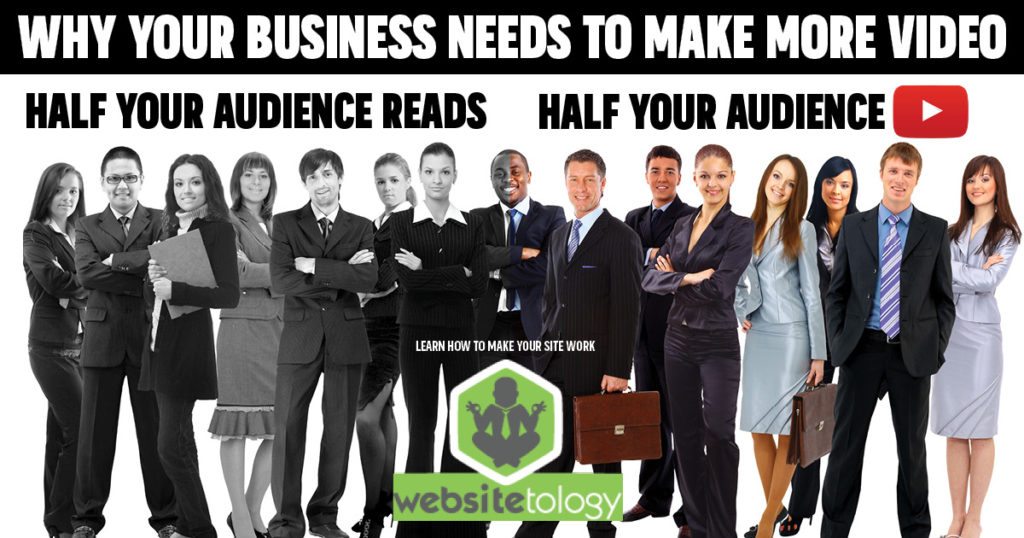 Old adage, well, not really that old… “Half the people read, half the people, watch TV (video) ~unkown.
Old adage, well, not really that old… “Half the people read, half the people, watch TV (video) ~unkown.
“Social Video” as defined by Cameron Uganec from Hootsuite is: “digital video that is designed to be seen and shared through social networks.” And he offers these three pointers to expand on that definition:
- “Social videos need to be optimized for different channels.” This is because a video that may work on YouTube may need to be drastically reduced in length to be successful on Facebook or Instagram. And what works on those platforms might not work on others like Twitter or Snapchat. For Facebook you need to upload videos natively, instead of linking out, so you have a much higher chance of your video being seen by your community and/or fans.
- “If it’s prerecorded, social videos need to be shareable.” You can’t only think of the channel, you also need to think about shareability. How does your content connect with your audience, what traditional conventions for how it’s produced have you used, does your social video compel your audience to want to share the video with their friends or colleagues?
- “Live social videos need to be about authenticity and real-time engagement.” In today’s age of brand relationships you have to have a real connection with your audience, you have to really care about and address what need it is that they are trying to solve. No longer do consumers what the hard sell about your product or service, they know what they are looking for and want to know that you are a business that they can trust to solve that need in a honest way.
Source: A Guide to Social Video, and Where it Fits in Your Marketing Plan
Here are 5 ways that you can leverage social video so that YOUR BUSINESS can make money.
- Because social networks like Facebook are now favoring video in their algorithms, you have a unique ability to connect with viewers. Sakal News restructured their content strategy to reach a wider audience by sharing interesting, relevant, and authentic content. They increased their video post frequency from 3 to 60 videos per week, and reaped the rewards with their views jumping from 333K in march to 10.5M video views in June. This equated to a 4x growth in reach since February. Be careful though, “while the Facebook algorithm is a definite positive for video, it will punish businesses and video creators who produce bad, lazy, or unoptimized video…… Don’t think of this as a punishment as much as an incentive to only share high quality content- something you should be striving to do anyways”.
- Social videos can deliver impressive ROI, with “72 percent of businesses who use video saying that it has increased website conversion rates”. The important aspect here is that you have to SET GOALS and TRACK the success of your videos using analytics. It is only through tracking that you will definitively learn how your audience behaves, and this in turn allows you to refine and redefine your social video strategy.
- Use social video to lift the behind the scenes veil of your business or company. In doing so you humanize your business, and it can also be a very effective way to attract not only new business but new talent as well!
- Leverage the interactivity of social videos for lead generation. Make sure you include an effective call-to-action to clearly tell viewers what you want them to do next. For Facebook you can create promotions that have a CTA (call-to-action) button below the video. YouTube allows you several different options for linking out from videos including overlays on the video itself, non-intrusive and timed callout bubbles, and including links in the description.
- “How-to videos” are amongst the most popular search queries on YouTube. Don’t assume that your customers intuitively know how to use your product. If they can see a video that demonstrates how-to use it in general or a feature, then you are providing value to your customers, solving their need and showing that you care enough to help. How-To video’s can also be used for brand awareness by offering help in a related topic.
Why do you have to optimize your video for different channels?
This is an embedded YouTube video The Next Wave made – you can toggle captions on/off and can see that it is easily sharable:
However, if we just stick it in Facebook- it won’t have captions, it won’t autoplay in the scroll, and although you can share FB videos outside of Facebook- they don’t always allow people without Facebook accounts to see them. Facebook does this on purpose- to make sure you stay on their site.
4 Quick Tips:
- Make sure that your video has captions so that people can watch at work, without getting caught.
- If you place your brand and message in the first 5-10 seconds of your video, people are 3X more likely to engage with it.
- Make sure that you know which platform your target audience is active on. Do this by initiating small tests on all the platforms and using tracking see which one/s drive the best results.
- Make a point to mention the call to action you want your viewers to take inside your actual video. (“Subscribe to my channel”, “click the link below to find out more”, “Send me your email”, etc.)
Since half the people read and half watch, are you creating half your content as video? Remember, Youtube is the second most popular search engine after Google.
Talk to us at The Next Wave for a systematic, customized and successful strategy for your social video needs. Do you know we also offer printing at fantastic rates? Talk to us today!
Interested in learning more about the internet and how to use WordPress to successfully promote your business on the web? Check out our live Websitetology 1 day class, where we help you become a master of the internet!
The final code that you will be using should look something like this:
<iframe src="https://www.youtube.com/embed/rWl4y1-rdMw?rel=0;3&autohide=1&showinfo=0" frameborder="0" width="635" height="353"></iframe>
*Note: The Youtube URL, Width, and Height will vary.
The part that needs to be added to the URL after the “rel=0” part is this:
;3&autohide=1&showinfo=0
Youtube will automatically give you all of the code that you need for the size and showing the related videos, so we only need to worry about the part listed above for the coding part. Just paste this after the “rel=0” section.
The end result will be similar to the way the video on this page looks. The dimensions of the video fit nicely into the blog post, and there will be a simple poster frame and play button instead of displaying the video info and the play bar at the bottom. There is also no border around the frame. When the video plays, you will notice that the play bar will hide itself as you hover away, but if you hover over the video you can still change the resolution, make the video fullscreen, enable captioning, etc. When the video is paused, the video title and information are not displayed. At the end of the video, the related videos are not displayed. This keeps the focus on your blog, and prevents something coming up that you may not want to associate with your blog. It appears that the newest form of embedded Youtube videos no longer have the Youtube logo in the corner of the video anymore, so we don’t have to worry trying to remove the Youtube logo.
Thankfully, the days of the not being able to edit the way your embedded Youtube videos look are apparently gone. For those who want to further customize their embedded videos, Google has a list of several other Youtube Embedded Player Parameters.

